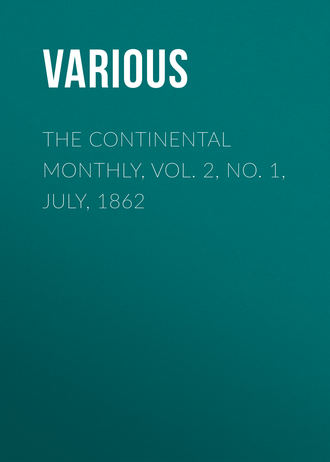 полная версия
полная версияThe Continental Monthly, Vol. 2, No. 1, July, 1862
'Oh! he was a dale sorry; but I guess he's glad to get rid of it!'
It was only a way he had.—Whiggles, on being told that a boy down-town, only sixteen years old, weighed six hundred and fifty pounds, was further enlightened by the information that he weighed that amount of coal on a platform Fairbanks.
The Southern press has proposed that, even in case of defeat, the wealthy class shall retire to their plantations, 'live comfortably' on what they can raise, let cotton go for two years, and thereby starve Europe and the North into a conviction that Cotton is King.
But how will the poor whites of the South like this? What is to become of them? Or what, indeed, is to become of us, if no cotton be forthcoming? The truth is, and every day makes it more apparent, the raising of cotton must pass into other hands. The army has its rights—the right to land-grants—and the only effectual means of putting an end to our dependence on the South will be found in settling soldiers in the cotton country. Texas would be, perhaps, best suited for the purpose, and other regions may be selected as opportunity may suggest. With this course fully determined on, it would hardly be necessary to further agitate Emancipation, it would come of itself, and slave-labor would yield to the energy of the free Northern farmer.
Very little has been said as yet on this subject of properly rewarding our troops. But it is destined to rise into becoming the great question of the day; and if the Democratic pro-slavery party sets itself in opposition to it, it will be ground to powder. Events are tending to this issue with irresistible and tremendous power, and the days of planterdom are numbered.
1
This anecdote has frequently gone the rounds in an abbreviated form. It may interest the reader to see it in authentic detail.
2
Richmond Examiner.
3
To which we add, 'An Account of the Proceedings preliminary to the Organization of the Massachusetts Institute of Technology, with a List of the Members thus far associated, and an Appendix, containing Petitions and Resolutions in aid of the objects of the Committee of Associated Institutions of Science and Art. Boston, 1861.' Also the Objects and Courses of Instruction in the Lawrence Scientific School. In the 'Catalogue of the Officers and Students of Harvard University, for the Academical Year 1860-1861.' The Editor will hold himself greatly indebted to any one who will kindly forward him catalogues or prospectuses relative to any scientific schools or institutes whatever, either in this country or Europe.
4
EDUCATIONAL CONDITION—CENSUS 1850.

It may be seen, by the foregoing table, that a thorough system of education for the masses requires that one third of the aggregate population should be kept at school for a goodly portion of the year. This is essential, under Democratic Government, in order to bring each generation up to the appreciative point.
5
The free colored population of Charleston in 1860, did not vary materially from four thousand. The associated value of their property would give to each $390. Each family or six persons would possess, according to this estimate, $2840. This would be a full average of wealth to the free population of the United States—the amount varying in the different States from $2200 to $2500 to each family of six persons.









